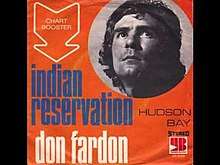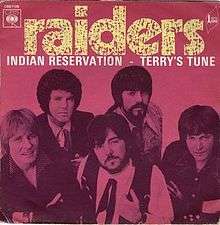Indian Reservation (The Lament of the Cherokee Reservation Indian)
| "Indian Reservation (The Lament of the Cherokee Reservation Indian)" | |
|---|---|
 | |
| Single by Don Fardon | |
| B-side | "Dreamin' Room" |
| Released | August 1968 |
| Format | 7-inch single |
| Length | 3:23 |
| Label |
|
| Songwriter(s) | John D. Loudermilk |
| Producer(s) | Miki Dallon |
| "Indian Reservation (The Lament of the Cherokee Reservation Indian)" | ||||
|---|---|---|---|---|
 | ||||
| Single by Raiders | ||||
| from the album Indian Reservation | ||||
| B-side | "Terry's Tune" | |||
| Released | February 1971 | |||
| Format | Vinyl record | |||
| Genre | Rock | |||
| Length | 2:55 | |||
| Label | Columbia | |||
| Songwriter(s) | John D. Loudermilk[1] | |||
| Producer(s) | Mark Lindsay | |||
| Raiders singles chronology | ||||
| ||||
"Indian Reservation (The Lament of the Cherokee Reservation Indian)" is a song written by John D. Loudermilk.[1] The song was first recorded by Marvin Rainwater in 1959 and released on MGM as "The Pale Faced Indian", but that release stayed unnoticed. The first hit version was a 1968 cover by Don Fardon—a former member of The Sorrows—that reached number 20 on the Billboard Hot 100[2] and number 3 on the UK Singles Chart.[3]
In 1971, The Raiders recorded the song on the Columbia Records label, and it topped the Hot 100 on July 24.[4] On June 30, 1971 the RIAA gold certified the record for selling over a million copies.[5] The record was later certified platinum for selling an additional million copies.[5] The song was the group's only Hot 100 number 1 hit and their final Hot 100 top twenty song.
Lyrics
A well-known story told by Loudermilk is that, when he was asked by the Viva! NashVegas radio show about the origins of the song "Indian Reservation", he fabricated the story that he wrote the song after his car was snowed in by a blizzard and he was taken in by a small group of Cherokee Indians.[6] A self-professed prankster,[7] he spun the tale that a Cherokee chieftain, "Bloody Bear Tooth" asked him to make a song about his people's plight on the Trail of Tears, even going so far as to claim that he had later been awarded "the first medal of the Cherokee Nation", not for writing the song, but for his "blood".[6] He went on to fabricate the detail that on that day the tribe revealed that his "great-great grandparents, Homer and Matilda Loudermilk" were listed on the Dawes Rolls (the citizenship rolls of the Nation).[6] Had this detail of his tall tale been true, he would have been a citizen of the Cherokee Nation, which he was not.[6] The Eastern Band of Cherokee Indians, the United Keetoowah Band of Cherokee Indians and the Cherokee Nation of Oklahoma communities are not known as "reservations."[8]
Below are partial lyrics from the Raiders' version:
- They took the whole Indian nation,
- Locked us on this reservation
- . . .
- Took away our native tongue,
- And taught their English to our young
- . . .
- [ CHORUS ]
- Cherokee people! Cherokee tribe! - [sung as shouting]
- So proud to live, so proud to die
- . . .
- Though I wear a shirt and tie,
- I'm still part redman deep inside...[9]
The lyrics vary somewhat among the recorded versions. Rainwater's version lacks the "Cherokee people!" chorus, but includes instead a series of "Hiya hiya ho!" chants. Fardon's version is similar to the Raiders' through the first verse and chorus, but differs in the second verse, which includes the lines "Altho' they changed our ways of old/They'll never change our heart and soul", also found in Rainwater's version. Rainwater includes some of the elements found in the other versions in a different order, and his first verse has words not found in the others, such as "They put our papoose in a crib/and took the buck skin from our rib".
At the end, where the Raiders sing "...Cherokee nation will return", Fardon says "Cherokee Indian...", while the line is absent in Rainwater's version, which ends with "beads...nowadays made in Japan." In addition, Fardon sings the line: "Brick built houses by the score/ No more tepees anymore", not used in the Raiders' version.
Cherokee people have never lived in tipis,[10] Nor do they call themselves or their children by ethnic slurs like "papoose."[11] These are stereotypes and misconceptions, with the reservations and tipi assumptions usually based on Hollywood portrayals of Plains Indians.[10][12] However the Cherokee are a Southeastern Woodlands Indigenous culture.[10]
Song structure
The music is in a minor key, with sustained minor chords ending each phrase in the primary melody, while the melody line goes through a slow musical turn (turning of related notes) which ends each phrase, and emphasizes the ominous minor chords. Underneath the slow, paced melody, is a rhythmic, low "drum beat" in double-time, constantly, relentlessly pushing to follow along, but the melody continues its slow, deliberate pace above the drum beat.
The instrumentation varies among versions. Rainwater's recording is acoustic with strings and backing vocals supporting the melody. Fardon's version adds a brass section and percussion, while reducing the background singing. The Raiders used similar instruments to Fardon, and includes an electronic organ that holds the melody line.
Personnel
- Paul Revere - keyboards
- Mark Lindsay - vocals, saxophone
- Mike "Smitty" Smith - drums
- Joe Correro, Jr. - drums
- Keith Allison - bass guitar
- Omar Martinez - drums, vocals
Charts
"Indian Reservation" entered the Billboard Hot 100 on April 10, 1971. It climbed to number two on late June, where it stayed for three consecutive weeks, stuck behind Carole King's double single "It's Too Late"/"I Feel the Earth Move". [5] On July 24, it reached the top spot for a single week. "Indian Reservation" spent a total of 22 weeks on the Billboard Hot 100 chart.[4]
Weekly chartsRaiders
Don Fardon
999
|
Year-end charts
|
Other versions
The UK punk band, 999, released a cover version on 14 November 1981 on the Albion Ion label, and it reached number 51 in the UK chart.[22] The song was also covered by the Orlando Riva Sound in 1979.
Billy ThunderKloud & the Chieftones covered the song in 1976 for Polydor Records, taking their version to number 74 on Hot Country Songs.[23]
The song is also covered as "National Reservation" by the Slovenian martial industrial group Laibach on their 1994 album NATO, replacing "Cherokee" in several places with "Eastern", in the context of the end of the Cold War and influx of capitalism in eastern Europe (and thus changing the context of "we're still a redman deep inside" to that of communism).
A 1994 country song by Tim McGraw, "Indian Outlaw", ends with part of the main "Cherokee people" chorus from "Indian Reservation".[24] The live version also uses the full chorus near the end of the song.
The Lewis and Clarke Expedition (featuring Michael Martin Murphey & Owen Castleman) released it in 1967 on the album "Earth, Air, Fire & Water". To note, they are one of the only rock bands other than the Monkees on the Colgems Records label (COS-105). This version is a sub-track on the album (listed as track 12.4).
The US punk band, Ill Repute, released a cover version on their album "What Happens Next" in 1984.[25]
See also
References
- 1 2 Jancik, Wayne The Billboard Book of One-Hit Wonders 1998. ISBN 0-8230-7622-9 page 247
- ↑ Whitburn, Joel, Top Pop Singles 1955–2002 Record Research Inc. 1997 pages 238, 589 ISBN 0-89820-155-1
- ↑ "Chartstats.com". Chartstats.com. 1971-01-30. Retrieved 2011-08-26.
- 1 2 Bronson, Fred, The Billboard Book of Number One Hits, Billboard Publications, Inc. 1985. ISBN 0-8230-7522-2
- 1 2 3 4 5 Whitburn, Joel (1997). Joel Whitburn's Top Pop Singles 1955–1996. Menomonee Falls, WI: Record Research Inc. p. 509. ISBN 0-89820-122-5.
- 1 2 3 4 "The Story Behind 'Indian Reservation'" on Viva! NashVegas on YouTube
- ↑ Sweeting, Adam (September 27, 2016). "John D Loudermilk obituary". The Guardian. Retrieved November 22, 2016.
- ↑ "Top 5 - Worst "Cherokee" Songs". Thoughts from Polly's Granddaughter - A little Cherokee history and genealogy mixed in with a whole lot of truth. 2011-11-08. Retrieved 2017-12-27.
5. Indian Reservation - Paul Revere and the Raiders: Reason - Historically inaccurate. The Cherokees never lived on a reservation. They lived in Cherokee Nation, a nation unto itself. Also, I am not fond of the line, 'But maybe some day when they've learned, the Cherokee Nation will return.' Return to what? We haven't gone anywhere.
- ↑ "Indian Reservation (The Lament of the Cherokee Reservation Indian) – Paul Revere & The Raiders – Google Play Music". Retrieved October 10, 2015.
- 1 2 3 "Did the Cherokee live in tipis?". Museum of the Cherokee Indian - FAQ. Retrieved 2018-08-03.
- ↑ Vowel, Chelsea (2016). "Just Don't Call Us Late for Supper - Names for Indigenous Peoples". Indigenous Writes: A Guide to First Nations, Métis & Inuit Issues in Canada. Winnipeg, Manitoba, Canada: Highwater Press. p. 7. ISBN 978-1553796800.
Let's just agree the following words are never okay to call Indigenous peoples: savage, red Indian, redskin, primitive, half-breed, squaw/brave/papoose.
- ↑ National Museum of the American Indian (2007). Do All Indians Live in Tipis?. New York: HarperCollins. ISBN 978-0-06-115301-3.
- 1 2 Canada, Library and Archives (17 July 2013). "Image : RPM Weekly". bac-lac.gc.ca.
- ↑ "flavour of new zealand – search listener". flavourofnz.co.nz.
- ↑ "Cash Box Top 100 7/24/71". tropicalglen.com.
- ↑ Canada, Library and Archives (17 July 2013). "Image : RPM Weekly". bac-lac.gc.ca.
- ↑ "DON FARDON full Official Chart History Official Charts Company". Official Charts Company. Retrieved 10 October 2015.
- ↑ "999 full Official Chart History Official Charts Company". Official Chart. Retrieved 10 October 2015.
- ↑ "Item Display – RPM – Library and Archives Canada". collectionscanada.gc.ca.
- ↑ "Top 100 Hits of 1971/Top 100 Songs of 1971". musicoutfitters.com.
- ↑ "Cash Box YE Pop Singles – 1971". tropicalglen.com.
- ↑ Roberts, David (2006). British Hit Singles & Albums (19th ed.). London: Guinness World Records Limited. p. 395. ISBN 1-904994-10-5.
- ↑ Whitburn, Joel (2008). Hot Country Songs 1944 to 2008. Record Research, Inc. p. 420. ISBN 0-89820-177-2.
- ↑ "Indian Outlaw – Tim McGraw – Google Play Music". Retrieved October 11, 2015.
- ↑ "Ill Repute - What Happens Next". Discogs. Retrieved 2017-07-27.